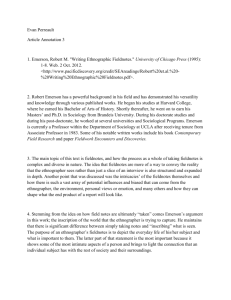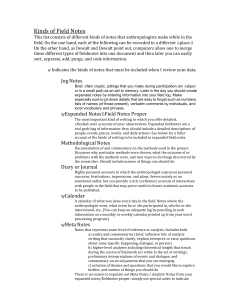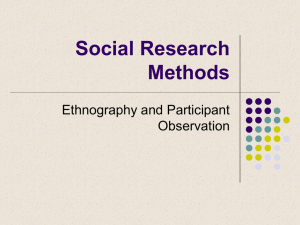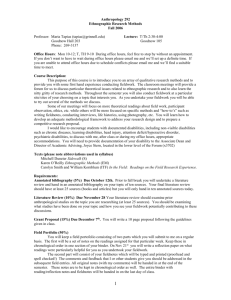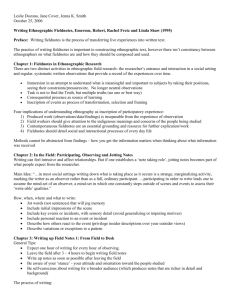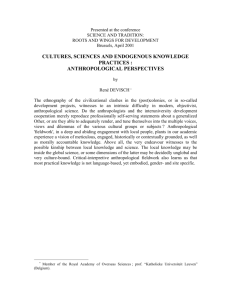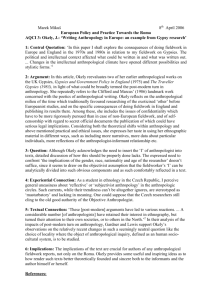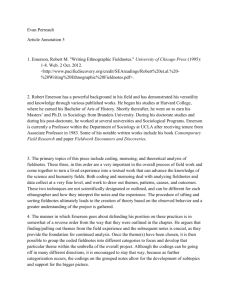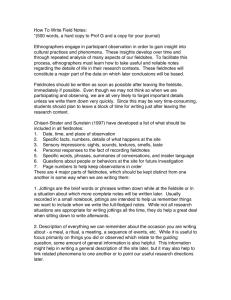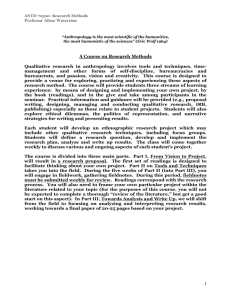ANTH 5040 - UNT Anthropology
advertisement
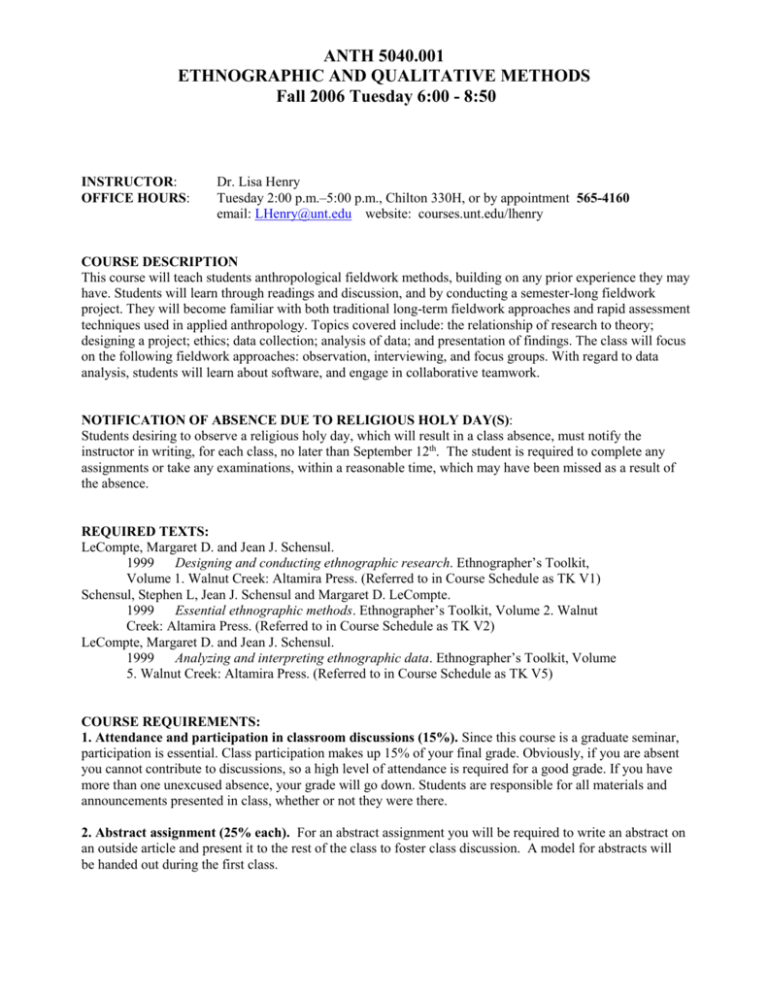
ANTH 5040.001 ETHNOGRAPHIC AND QUALITATIVE METHODS Fall 2006 Tuesday 6:00 - 8:50 INSTRUCTOR: OFFICE HOURS: Dr. Lisa Henry Tuesday 2:00 p.m.–5:00 p.m., Chilton 330H, or by appointment 565-4160 email: LHenry@unt.edu website: courses.unt.edu/lhenry COURSE DESCRIPTION This course will teach students anthropological fieldwork methods, building on any prior experience they may have. Students will learn through readings and discussion, and by conducting a semester-long fieldwork project. They will become familiar with both traditional long-term fieldwork approaches and rapid assessment techniques used in applied anthropology. Topics covered include: the relationship of research to theory; designing a project; ethics; data collection; analysis of data; and presentation of findings. The class will focus on the following fieldwork approaches: observation, interviewing, and focus groups. With regard to data analysis, students will learn about software, and engage in collaborative teamwork. NOTIFICATION OF ABSENCE DUE TO RELIGIOUS HOLY DAY(S): Students desiring to observe a religious holy day, which will result in a class absence, must notify the instructor in writing, for each class, no later than September 12th. The student is required to complete any assignments or take any examinations, within a reasonable time, which may have been missed as a result of the absence. REQUIRED TEXTS: LeCompte, Margaret D. and Jean J. Schensul. 1999 Designing and conducting ethnographic research. Ethnographer’s Toolkit, Volume 1. Walnut Creek: Altamira Press. (Referred to in Course Schedule as TK V1) Schensul, Stephen L, Jean J. Schensul and Margaret D. LeCompte. 1999 Essential ethnographic methods. Ethnographer’s Toolkit, Volume 2. Walnut Creek: Altamira Press. (Referred to in Course Schedule as TK V2) LeCompte, Margaret D. and Jean J. Schensul. 1999 Analyzing and interpreting ethnographic data. Ethnographer’s Toolkit, Volume 5. Walnut Creek: Altamira Press. (Referred to in Course Schedule as TK V5) COURSE REQUIREMENTS: 1. Attendance and participation in classroom discussions (15%). Since this course is a graduate seminar, participation is essential. Class participation makes up 15% of your final grade. Obviously, if you are absent you cannot contribute to discussions, so a high level of attendance is required for a good grade. If you have more than one unexcused absence, your grade will go down. Students are responsible for all materials and announcements presented in class, whether or not they were there. 2. Abstract assignment (25% each). For an abstract assignment you will be required to write an abstract on an outside article and present it to the rest of the class to foster class discussion. A model for abstracts will be handed out during the first class. 3. Fieldwork project (60%). Students will conduct a collaborative project over the course of the semester. You will turn in six items documenting your fieldwork. These are the items and how much their grades are worth: Item Observation fieldnotes Interview transcript Interview fieldnotes & reflections Focus group transcript Focus group fieldnotes & reflections Analysis write up Client Presentation % of Grade 10% 10% 5% 10% 5% 10% 10% Withdrawal: If you are unable to complete this course you must withdraw by Oct. 6 (for a “W” with instructor approval), by Oct. 31 (for a “W” or “WF,” as determined by the instructor, with instructor approval). Withdrawing from a course is a formal procedure which YOU must initiate. I cannot do it for you. If you simply stop attending and do not withdraw, you will receive a performance grade, usually an “F.” STATEMENT ON PLAGIARISM AND CHEATING. The department of anthropology considers graduate students to be new members of the community of professional anthropologists, who are thus held to the high ethical standards of practicing professionals. They are expected to follow the American Anthropological Association’s code of ethics: “Anthropological researchers bear responsibility for the integrity and reputation of their discipline, of scholarship, and of science. Thus, anthropological researchers are subject to the general moral rules of scientific and scholarly conduct: they should not deceive or knowingly misrepresent (i.e., fabricate evidence, falsify, plagiarize), or attempt to prevent reporting of misconduct, or obstruct the scientific/scholarly research of others” (http://www.aaanet.org/committees/ethics/ethcode.htm). Any work not meeting this standard will be evaluated in a hearing before the student; infractions will merit dismissal from the master’s program. For more information on paper writing, including how to avoid plagiarism, and how to use citations, see http://www.unt.edu/anthropology/writing.htm. For information on the University’s policies regarding academic integrity and dishonesty, see the UNT Center for Student Rights and Responsibilities, http://www.unt.edu/csrr/. Note: The Anthropology Department does not discriminate on the basis of an individual’s disability as required by the Americans With Disabilities Act. Our program provides academic adjustments or help to individuals with disabilities in its programs and activities. Attempts will be made to meet all certified requirements. COURSE SCHEDULE AND READING ASSIGNMENTS Date Topics and Assignments Core readings: (to be read before class) _______________________________________________________________________________________ Aug. 29 Introduction to course _______________________________________________________________________________________ Sept. 5 Social Science, Anthropology and Ethnography TK V1 Ch. 1-2 TK V2 Ch. 1 Assignment due: 1. abstract handout - diabetes 2. read and be prepared to discuss at least one article on type II diabetes _______________________________________________________________________________________ Sept. 12 Theory and epistemology TK V1 Ch. 3 TK V2 Ch. 2 Assignment due: 1. abstract _______________________________________________________________________________________ Sept. 19 Ethics and Research TK V1 Ch. 8-9 IRB Presentation Guest Speakers - Boyd Herndon – Director of Research Compliance Scott Simpkins, Professor of English and IRB Chair Assignment due: 1. abstract 2. read over the AAA code of ethics http://www.aaanet.org/committees/ethics/ethcode.htm _______________________________________________________________________________________ Sept. 26 Research Design Part 1 TK V1 Ch. 4-5 TK V2 Ch. 3, 10 Assignment due: 1. abstract 2. NIH Human Subjects Training certificate http://cme.cancer.gov/clinicaltrials/learning/humanparticipant-protections.asp print a copy of the NIH certificate for me – turn in on the 26th _______________________________________________________________________________________ Oct. 3 Research Design Part II TK V2 Ch. 4, 11 TK V1 Ch. 6 Class activity: design research plan ______________________________________________________________________________________ Oct. 10 Observation and Fieldnotes TK V2 Ch. 5 Assignment due: 1. abstract Class activity: finish research plan, if necessary handout – observation handout – fieldnotes _____________________________________________________________________________________ Oct. 17 Informants and Interviewing TK V2 Ch. 6-7 Assignment due: 1. observation fieldnotes due 2. abstract Class activity: design interview _______________________________________________________________________________________ Oct. 24 Focus Groups handout - guide Assignment due: 1. 1st interview transcript and fieldnotes Class activity: design focus group questions and practice focus groups _______________________________________________________________________________________ Oct. 31 Analysis of Qualitative Data Part I TK V1 Ch. 7 TK V5 Ch. 1-6 Assignment due: 1. 2nd interview transcript and fieldnotes Class activity: learn qualitative analysis program _______________________________________________________________________________________ Nov. 7 Analysis of Qualitative Data part II TK V5 7-8, 10-11 Assignment due: 1. focus group transcript and fieldnotes Class activity: data analysis _______________________________________________________________________________________ Nov. 14 Analysis of Qualitative Data part III Class activity: data analysis _______________________________________________________________________________________ Nov. 21 Analysis of Qualitative Data part IV Class activity: data analysis _______________________________________________________________________________________ Nov. 28 Analysis of Qualitative Data part V Assignment due: 1. draft of analysis Class activity: data analysis _______________________________________________________________________________________ Dec. 5 Wrap Up – work on presentation Assignment due: 1. draft of analysis Class activity: data analysis _______________________________________________________________________________________ Dec. 12 Client Presentation _______________________________________________________________________________________ Note: The instructor reserves the right to add, delete, or revise segments of this course or syllabus

